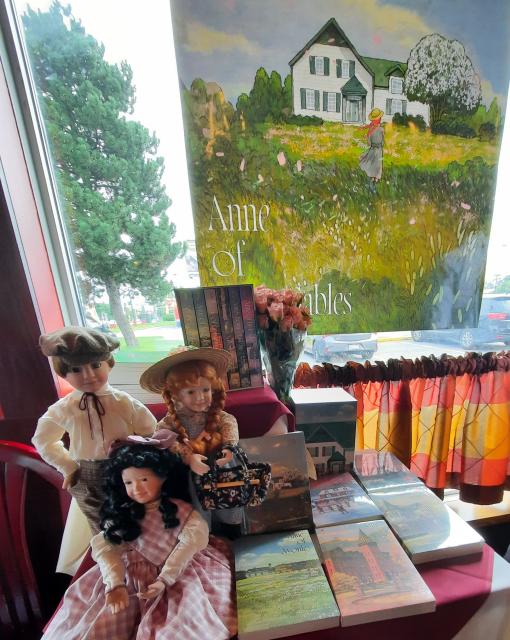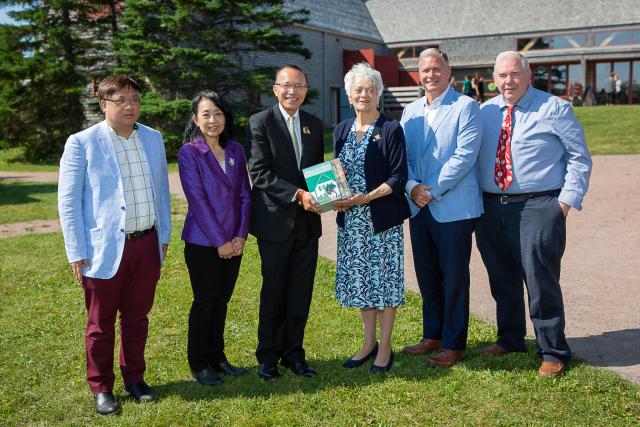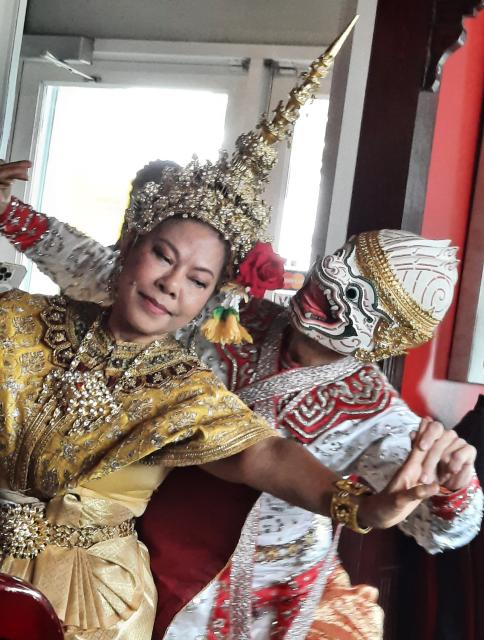In June 2024, during L.M. Montgomery’s 150th birthday celebration, Liberal Member of Parliament for Ottawa West–Nepean Anita Vandenbeld announced the delightful news that a Thai translation by Varavadi V. Monaghan of the Anne of Green Gables series had been published and that the Thai language translation of the Anne books would be presented to Thai and Canadian dignitaries as “a symbol of the culture bridge” between the two countries. Long considered a Canadian cultural icon, Anne Shirley has now become a cultural ambassador to Thailand. I had a chance to ask award-winning translator Varavadi V. Monaghan about herself and her translation of Montgomery’s famous Anne series in September 2024.
“What a small big world it is! And how far little red-haired Anne has travelled!”1
Yuka Kajihara-Nolan (YKN): Congratulations on the publication of your translation of the Anne series. Each book in the series is so beautifully illustrated, capturing the Anne atmosphere her fans find so endearing.

Releasing all the books together as a series is a wonderful achievement that allows readers to follow Anne’s life from her first moments in Avonlea through to motherhood, all together in one collection.
Varavadi, I am sure readers would like to know about the path that brought you to the completion of this series of translations. Can you tell us about yourself, including your favourite authors and books from your childhood? And how did you first discover the Anne books?
Varavadi V. Monaghan (VM): I was a university lecturer in Thailand. I taught English and American Literature at the undergraduate level for about ten years before I was married and moved to Canada in 2000. I had also worked on some translation back then, but due to my very demanding teaching job, translation wasn’t a priority—not until I resigned and moved to Canada. Since then, I have focused more on translation, writing, and teaching Thai to Canadian diplomats, plus carrying on some other business activities concerning education, tourism, importing, and retail.
Like most children in my generation, I grew up with Grimms’ and Andersen’s fairy tales, Aesop’s stories, and some Greek mythology read to me by my dad. No wonder I believed in fairies (and still do!). When I was grown up enough to read by myself, I read children’s literature from around the world, translated into Thai and available in Thailand at that time: Japanese, American, British, French, etc.—I read them all! But children’s stories that never left my mind are Totto-Chan: The Little Girl at the Window,2 Little House on the Prairie, The Little Prince, Peter Pan, and The Tale of Peter Rabbit. Those books stayed with me and shaped my thoughts.
When I came to Canada the first time in 1992 to visit a Canadian friend (now my husband), I asked if he could recommend a good Canadian book for me to read, and he introduced me to Anne of Green Gables. He even told me that the actual Green Gables house was in Prince Edward Island, so I believed for a long time that Anne was a real person.
YKN: A Thai translation version of Anne was not available when you grew up in the country. Is your translation the first one?
VM: No. Mine is the second. The first Thai translation of Anne was done a few decades ago; not the whole complete set of eight like mine, and it’s been out of print for a while. Thanks to the previous translation, though, there were some Thai readers who knew Anne through it and had loved her before the Netflix series arrived. Unfortunately, during that time, I didn’t know it existed, so I never got a chance to read that version.
YKN: These days, a variety of adaptations of Anne are available, as films, TV shows, and animations. Is Anne Shirley a familiar character in Thailand?
VM: Sadly, Anne was not as well known among Thais as among other readers around the world. Most Thai people just recently got to know Anne from the 2017 Netflix series Anne with an “E,” and some might have known her before from other sources. And even though Japanese anime has always been very popular in Thailand throughout the decades, Anne anime has never been shown there. If only it had, Anne might have been very widely loved by all Thais already. In other words, there was very little to help Thai people know Anne. Plus, the knowledge about Canada among Thai people in general wasn’t that great either, compared to their knowledge of countries like the USA or UK, let alone its literature. So, Anne has been like a hidden gem, waiting to be discovered and loved.
YKN: How wonderful it is that the “hidden gem” could be soon discovered by many Thai readers. Can you tell me how you got your inspiration for the translation?
VM: It’s quite a saga! After I had fallen in love with Anne of Green Gables and, through time, gradually read almost all in the series, I wanted to translate them, but other works were always in the way. In other words, I never found the right time. When the series Anne with an “E” was released, it renewed my intention, mainly because I wanted Thai readers to know Montgomery’s Anne, rather than the adaptation’s. However, I was still engaged in teaching [Thai to Canadian diplomats], so the thought was still not concrete. Then in early 2019, I was contacted by the Translator and Interpreter Association of Thailand, informing me that I had been chosen to receive the Surindaraja award for best translator of the year. It wasn’t for any particular work, but for a lifetime achievement—an annual award given to translators who had worked for over twenty years and had produced outstanding works. That was a pleasant surprise and a great honour. The award then was a big push for me to decide that I couldn’t put off the Anne project anymore. I took the book from my bookshelf, began rereading, started to make a plan, and then came the pandemic! Everything was shut down, and everybody’s life was put on hold, including mine, so the plan was put away for another couple of years because we all had to deal with the so-called “new normal.” Then in 2021, after the pandemic had started to ease, it happened to be the sixtieth year of diplomatic relationships between Canada and Thailand. In the Thai community, we were thinking of doing something special to celebrate this occasion. And that’s when I, as a translator, said to myself that this is it—the timing couldn’t be better. So, I informed the school where I was teaching and my Canadian diplomat students and took the whole year off and started right away.
YKN: Congratulations on your receiving a lifetime achievement award. As you are a skilled and experienced translator, I wonder how long it took for you to translate all the Anne books.
VM: It took me the whole year for the first six books. I had intended to have them published in 2022, but that same year I was informed by the first publisher that it had to be delayed for another two years, so I asked to terminate the contract because I couldn’t wait any longer. While I was thinking of finding a new publisher, Words Wonder Publishing in Bangkok, Thailand, contacted me and asked if they could have the honour to publish Anne. To my surprise, the publisher had read the book before—not just knew of it. After I found out we had the same ambition to publish the complete set of eight, I said yes straightaway. The first set of six then was launched in 2023, and the final two, which took me another four months to finish, will be launched in October 2024.3
YKN: Anne grows up throughout the series. What decisions did you make in dealing with the shift of focus and language from children’s literature to youth fiction to more adult fiction?
VM: Honestly, I didn’t feel like I had to deal with any changes, especially language. Even the first book, I didn’t feel that it’s a children’s book at all, but rather a book about children with the main character who is a girl named Anne. It’s like many other classic books about children but not books written for children—like Mark Twain’s Adventures of Huckleberry Finn or Charles Dickens’s Oliver Twist. For instance, the language of Anne of Green Gables is not simple, and the book contains so many cultural references and quotations from classical poetry that can be enjoyed by both adults and young people. Therefore, I didn’t need to deal with any change. As Anne grows up while the story progresses in each book, I felt I was gradually growing up with her too. As she was learning to understand herself, I was learning to understand her, so no big jump, just gradually growing—in every situation and event, just like our own life. As for the language style in each book, I didn’t feel that the first book is easier than the last one either. It’s just the plots that changes into more adult fiction.
YKN: What is the hardest thing about translating Anne into Thai? What did you most enjoy about translating, and what were the biggest challenges?
VM: One of the hard things was certainly the cultural difference. I think it must be a challenge for every translator—how are we going to convey the story from a different language and culture than our own, while still keeping the whole spirit of the story in our language. But the hardest thing for me would be all the quotations from classical poetry in every book. It’s not easy to translate poems into poems, and I refused to translate poems into prose. Fortunately, I love poetry, though it was very hard, so it became another challenge and joy for me at the same time.
YKN: Talking about cultural differences, the Scottish-Presbyterian Canada of Anne’s world in the late-nineteenth and early-twentieth centuries is different from modern multicultural Thailand. Did you feel the need to add any explanation of the different cultural context for your readers?
VM: Certainly. I put hundreds of footnotes in all the books where necessary, plus appendices to explain not only cultural/religious/political aspects, but also many other literary quotations that Montgomery used throughout her eight books. Since living in Canada has given me enhanced advantages for researching, I couldn’t do any less than what I did. For example, when I wasn’t sure about some Presbyterian terminology, and even though I could already find some references, I still picked up the phone and called a Presbyterian church in Charlottetown, and I got a clear explanation straight away. Or, when I wanted to make sure I interpreted some part correctly, I discussed with some scholars and my editor, who was very knowledgeable. I intended to make my translation accurate and informative, so that it would help Thai readers truly understand every aspect in the book while enjoying the story of the little red-haired girl, and I’ve received a lot of good feedback on that—very rewarding.
YKN: Nice to know you have already received positive feedback. Reading through those annotations, Thai readers will learn something about Canadian history and the lives of Canadian women through your translation, as well as the natural beauty of Prince Edward Island. What do you hope Thai readers will learn from your translation?
VM: Maybe what I hope for the readers is not really to learn but more to enjoy, absorb, and appreciate the true spirit of Canada and of Anne, the little orphan girl, who not only uses her imagination and positive attitude to make herself be able to face the not-so-nice world but also inspires people around her grow to be better persons. Throughout the many decades that I have known Anne, I have found myself growing up with her, as if we were true kindred spirits. I also learned to face the world as Anne does. If there would be anything I’d hope for the readers to get from the books through my translation, perhaps this is it.
YKN: Do you have a favourite quotation from the Anne series?
VM: I do have so many! But there are a couple I love the most. One is from chapter 38 of Anne of Green Gables, “I don’t know what lies around the bend, but I’m going to believe that the best does,” which has become my attitude towards the world. Anne taught me to be a positive thinker. Another is from chapter 10 of the same novel, “It’s lovely to be going home and know it’s home.” Because we travel a lot, this quotation is exactly how I feel every time we come back home and know it’s home.
YKN: What is your next translation project? Are you thinking of translating another of Montgomery’s books?
VM: Not immediately. I’d like to give translation a little pause. Now that I have finished the whole big set of Anne’s eight books, I’d like to do some writing to support Anne’s story and her world. In other words, I’d like Thai readers to get to know more about Montgomery and her charming little red island—the more they know, the more they’d love Anne. So, it means a lot more research is to be expected from now on! I will also spend time working on the “Canada-Thailand Culture Bridge” project that my husband and I started. The idea is to use Anne’s Thai version as a bridge to increase visibility and interest between our two countries so that it could spark many future projects that benefit both, in education, tourism, or arts of any kind.4 So far, I have presented the book set to dignitaries in Ottawa, and in August in PEI to the lieutenant governor, the premier, and the Robertson Library, UPEI.


We also had binational performances after the presentation, and we hope to do the same thing in Thailand when we launch the final two books this October. We hope this little bridge we’re building will be well crossed in the near future. By that time, it may not have to be me who translates other Montgomery books. It could be many other translators, and I’d consider my mission accomplished.
YKN: It is very exciting to hear of Varavadi’s future projects to help spread the world of Anne to Thai readers. At last, a new translation of Anne has landed in Thailand, and we hope she finds a new home in the hearts of readers in Thailand in the years to come and that Anne will endure as a strong cultural bridge between Thailand and Canada.
About the Author: Yuka Kajihara-Nolan is a writer and works at a branch of the Toronto Public Library. An Honorary Chair of the Lucy Maud Montgomery Society of Ontario, she has organized many tours to Montgomery’s Ontario sites.
Banner Image: Book covers for Varavadi V. Monaghan's translations of Anne of Green Gables, Anne of Avonlea, Anne of the Island, and Anne of Windy Willows. Used with permission from the translator and publisher.
- 1 Montgomery, CJ 2 (30 Sept. 1910): 314.
- 2 First published in 1981 by Kodansha of Tokyo, The Little Girl at the Window. The book is a memoir of popular Japanese television personality, actor Tetsuko Kuroyanagi (1933– ). It has been translated into numerous languages and sold over twenty-five-million copies worldwide and certified by Guinness World Records as the most published autobiography by a single author in 2023. See https://www.guinnessworldrecords.com/world-records/754823-most-copies-p….
- 3 Since the interview, these have been published. See Words Wonder Publishing, https://www.wordswonderbook.com/.
- 4 See Anita Vandenbeld’s X. post (6:19 PM, 24 June 2024 from Ottawa, Ontario), https://x.com/anitavandenbeld/status/1805365077157224475.
Works Cited
Montgomery, L.M. The Complete Journals of L.M. Montgomery: The PEI Years, 1901–1911. [CJ 2]. Edited by Mary Henley Rubio and Elizabeth Hillman Waterston, Oxford UP, 2017.
